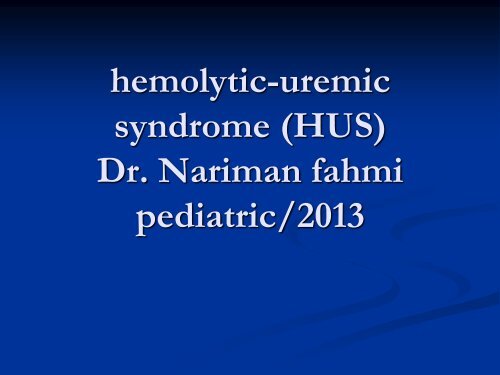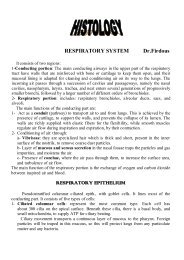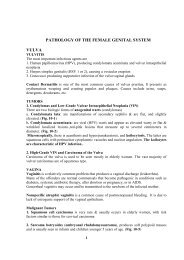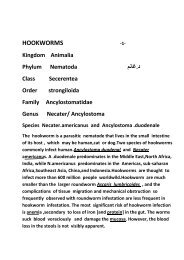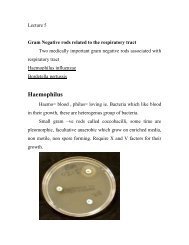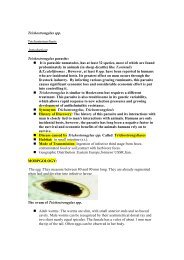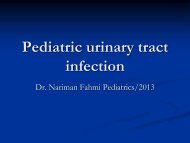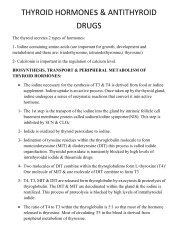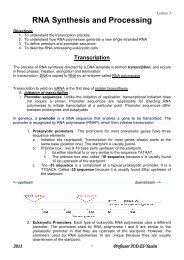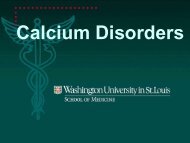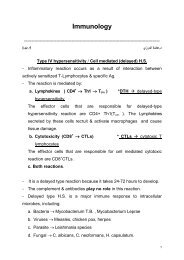hemolytic-uremic syndrome (HUS)
hemolytic-uremic syndrome (HUS)
hemolytic-uremic syndrome (HUS)
Create successful ePaper yourself
Turn your PDF publications into a flip-book with our unique Google optimized e-Paper software.
<strong>hemolytic</strong>-<strong>uremic</strong><br />
<strong>syndrome</strong> (<strong>HUS</strong>)<br />
Dr. Nariman fahmi<br />
pediatric/2013
objectives<br />
• Definition<br />
• Classifications<br />
• Pathogenesis<br />
• Clinical manifestations<br />
• Diagnosis<br />
• management
Definition<br />
The most common cause of acute renal<br />
failure in young children<br />
It is classically characterized by the triad<br />
of<br />
• microangiopathic <strong>hemolytic</strong> anemia<br />
• Thrombocytopenia<br />
• uremia
classifications<br />
• Typical <strong>HUS</strong><br />
• Atypical <strong>HUS</strong>
• Diarrhea form is usually transmitted by<br />
undercooked meat or unpasteurized milk.<br />
• Outbreaks have usually followed ingestion of<br />
undercooked hamburger at fast food<br />
restaurants. Outbreaks also occur with<br />
diarrheal epidemics after swimming in<br />
contaminated ponds, lakes, or pools as well<br />
as eating contaminated milk, cheese,Iettuce,<br />
or apple cider
The diagnosis is supported by the<br />
findings of a<br />
• microangiopathic <strong>hemolytic</strong> anemia<br />
• thrombocytopenia<br />
• and acute renal failure
Renal manifestations<br />
vary from<br />
-Mild renal insufficiency<br />
-Acute oliguric or Anuric renal<br />
failure requiring dialysis.
COMPLICATIONS<br />
• Anemia<br />
• Acidosis<br />
• Hyperkalemia<br />
• Fluid overload<br />
• Heart failure<br />
• Hypertension<br />
• Uremia.
Extra renal manifestations<br />
• Central nervous system dysfunction includes<br />
irritability, seizures, infarcts of the basal<br />
ganglion and cerebral cortex, cortical<br />
blindness, and coma.
Gastrointestinal manifestations<br />
• ischemic or inflammatory colitis, intestinal<br />
perforation, intussusception, and hepatitis.
Other affected systems<br />
• Pancreace acute pancreatitis, glucose<br />
intolerance, insulin-dependent diabetes<br />
mellitus.<br />
• Pericarditis, myocardial dysfunction,<br />
arrhythmias may be seen in cases with<br />
cardiac involvement.<br />
• Other complications such as skin necrosis,<br />
parotitis, adrenal dysfunction, and<br />
rhabdomyolysis have been reported.
Management<br />
• Blood transfusion for symptomatic<br />
anemia<br />
• control of hypertension<br />
• meticulous attention to fluid and<br />
electrolytes<br />
• Early institution of dialysis<br />
• NO Antibiotic therapy for E. coli<br />
0157: H7 it will increase risk of<br />
<strong>HUS</strong>
Early<br />
institution of<br />
dialysis
prognosis<br />
• With aggressive management of<br />
acute renal failure<br />
• more than 90% of patients<br />
survive the acute phase of <strong>HUS</strong><br />
with a diarrheal prodrome.
• Death or end-stage renal<br />
disease affects 12%<br />
• Hypertension, proteinuria<br />
affects 25%
long-term follow-up required<br />
because complications such<br />
as<br />
• hypertension<br />
• chronic renal insufficiency<br />
• proteinuria may not be apparent<br />
for up to 20 yr
THANK YOU


